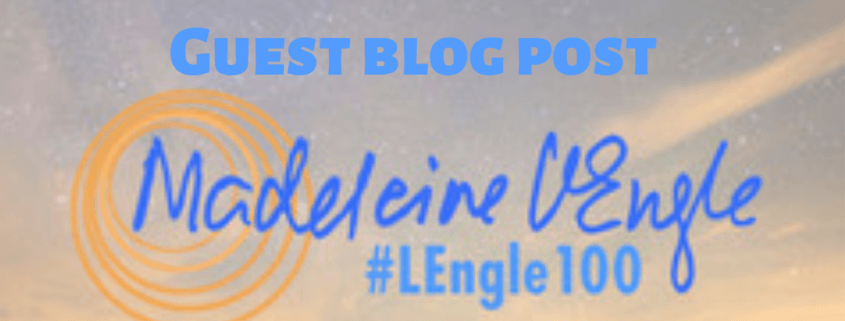Guest blog post: “Are you sure you want to know the future?”
“Are you sure you want to know the future?” Madeleine asked in all seriousness and waited for my response. She sat up in her four-poster bed, draped in luxuriant covers, and I sat at the edge. She was remarkably generous, inviting so many of her students into her home, nurturing and guiding us, hungry disciples at her feet. And there I was having my turn, asking her for advice about my literary life, longing to know where it all would lead.
I was very young back then. And anxious. Madeleine knew that. Anxious about life. Anxious to succeed. The kind of young woman who works hard and expects results. From herself. From the world. But Madeleine knew better. She had experienced the random cruelty of action and reaction. She knew that there were no guarantees – not good parenting or opportunity or wealth. Not knowing the right people or accolades for your work. That there were things far more important than writing. I didn’t know all the private details of her life, but I’d heard a few things from classmates in her writing workshop. It was only faith that had gotten her through the worst of it, and a private kind of mourning that never ends. So when she leaned forward in her bed, propped against a mountain of fat pillows, and pressed my hand with hers, “What if it’s bad?” I didn’t know what to think.
It took me years to understand that life is a balance of triumphs and losses, that writing is just one part of a very complex journey. When I sold my first novel, I thought it would change my life. And it did, but not in the way I’d expected. While I stayed home doggedly writing my next book, I was also home to raise my children. And being home with my children made me long to get out of the house. So I started teaching just once a week, sharing my love of writing with my local community.
Being a mother helped me realize something else: that creativity starts at birth, that imagination is innate, and that it absolutely must be respected and nurtured. Watching my kids playing helped me create a creative writing curriculum that spoke to their creativity, not the expectations or requirements of adults. Together, those classes grew into The Writers Circle in New Jersey where students of all ages learn to love creative writing every day.
When I first entered the classroom, I modeled my approach on Madeleine’s, remembering all of us gathered around the old oak table holding our precious, uncertain words in our shaking hands. I remembered her generosity and gentle, supportive words, how she crafted her suggestions to suit each writer. Madeleine met each of us at our deepest need, not only as writers, but as people seeking guidance and wisdom from a woman who had touched all our hearts long before we ever met her.
I try to do the same with my students every day. At the beginning of each workshop, I welcome new writers with a short piece I wrote for Madeleine to celebrate her 80th birthday. That year our group of Madeleine-alums all wrote short pieces in her honor and handbound them into a book. Mine reflects on the spirit that we carried from Madeleine into our own small writers group. I encourage my students to carry on that spirit in our workshop and beyond.
Today, both my kids are teenagers, one heading off soon to college. And that new novel of mine hasn’t yet sold. So I’m polishing up another. But the rejections I’ve endured have made me a better writer and a better teacher. The struggle has given me the grit to carry on and to help others do the same. Sometimes I remind myself that Madeleine was rejected 26 times before A Wrinkle In Time became one of the great classics of children’s literature.
If I had known the future back then, what would I have thought of what I have and haven’t achieved? I’d have been proud of being published, that’s for sure. But perhaps I wouldn’t have fully appreciated the most important work I do now: passing on Madeleine’s gift of guidance and sharing, of listening and accepting this long journey of writing and life every day.
Now I understand a bit better what Madeleine was telling me that day: that not knowing—either the good or the bad—is part of the mystery.
 Judith Lindbergh’s debut novel, The Thrall’s Tale, about three women in the first Viking Age settlement in Greenland, released to critical acclaim in 2006. She’s the founder and director of The Writers Circle in New Jersey, facilitating creative writing for students of all ages. She traces her teaching approach to her background as a professional dancer and actress and from the lessons learned from L’Engle, with whom she studied in the early 1990s. Judith will be part of a panel at the upcoming Madeleine L’Engle Conference: Walking on Water.
Judith Lindbergh’s debut novel, The Thrall’s Tale, about three women in the first Viking Age settlement in Greenland, released to critical acclaim in 2006. She’s the founder and director of The Writers Circle in New Jersey, facilitating creative writing for students of all ages. She traces her teaching approach to her background as a professional dancer and actress and from the lessons learned from L’Engle, with whom she studied in the early 1990s. Judith will be part of a panel at the upcoming Madeleine L’Engle Conference: Walking on Water.
Twitter and IG: @JudithLindbergh
Do you have something you’d like us to share with our blog readers? We are taking submissions for guest blog posts. Email: social [at] madeleinelengle [dot] com


